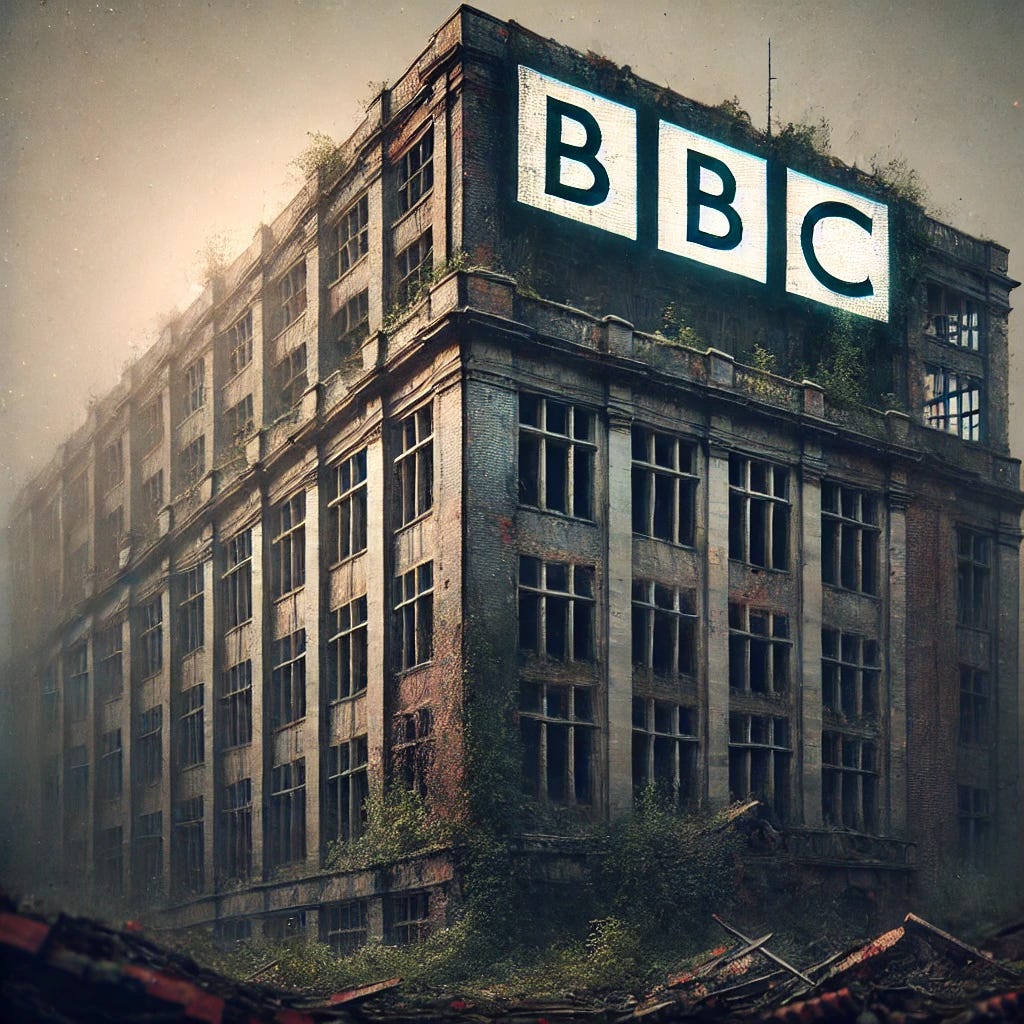The BBC is Falling Apart—But It’s Not Too Late to Fix It
Four Changes for a Stronger BBC
Something needs to change. But are the decision-makers too caught up in the details to see the bigger picture?
I've outlined four areas that need urgent attention. In the short term, these changes might be costly, but in the long run, they could help secure the BBC’s survival.
1. Staggered License Fees: Making the BBC Affordable for All
The current license fee is a blunt instrument that fails to reflect how audiences engage with the BBC. A few weeks ago, former Culture Secretary Lucy Frazer proposed a layered fee structure—an idea I fully support, though I think it could go much further.
A tiered system would make the BBC more accessible:
Basic Tier – A significantly reduced fee, covering BBC1, radio, online news, and a reimagined BBC4. Essential public service content for all.
Standard Tier – Priced at the current level, adding entertainment channels like BBC2, BBC Sounds, and full iPlayer access.
Premium Tier – Unlocking the BBC archive, giving creators, educators, and historians access to a treasure trove of material.
Government Funding for the World Service
Frazer also suggested that the government directly fund the BBC World Service—a great idea. The soft power it projects is invaluable, and removing it from the license fee could make the system more palatable. Even if it’s just robbing Peter to pay Paul, it’s still a start.
This tiered model keeps the BBC affordable, while generating additional revenue to support its future.
2. Unlocking the Archive: A Goldmine for Creativity
The BBC’s archive is one of its most valuable but neglected assets. Decades of news, documentaries, and iconic programming sit unused—hidden from the very people who paid for it.
By opening up the archive for public use in the UK, the BBC could:
Boost the Creator Economy – Independent filmmakers, educators, and online creators could repurpose footage for documentaries, history programs, and educational content.
Generate Revenue – Licensing archive content for a small tariff creates a new income stream.
Celebrate British Heritage – Giving access to historical programming reinforces the BBC’s role as a custodian of the nation’s memory.
This one is tricky. It will seriously upset some archive houses—but let’s be honest, no one is mining this content, and it’s going to waste.
3. A Shortened Program Clock: Modernising the BBC for Global Audiences
BBC programs often run close to 60 minutes, while commercial broadcasters and streamers stick to 44-minute formats, leaving room for adverts. This mismatch hurts the BBC’s ability to sell content internationally.
Switching to a 44-minute format would:
✔ Improve Storytelling – Tighter runtimes = sharper pacing and less filler.
✔ Reduce Costs – Shorter episodes mean lower production expenses.
✔ Increase Global Appeal – 44-minute programs align with international syndication, reducing costly re-edits.
But What About Scheduling?
Would it mess up traditional TV timings? Not really.
The schedule would simply "reset" every three hours.
Key time slots—6pm, 9pm, and midnight—would still start on the hour.
The 10 o’clock news could move back to 9pm, pushing premium 9pm content to another channel—potentially driving people to higher-tier subscriptions.
Or, move the news to 10:30pm and keep the entertainment slot at 9pm.
Either way, shorter programs are the future. Whether we like it or not, attention spans are shrinking, and shorter is better.
4. Reimagining BBC4: A Launchpad for Independent Creators
BBC4 has long been a home for niche and thought-provoking programming, but it needs a new mission.
In a previous article, I wrote about how TV is shifting towards private capital-funded content rather than traditional commissioning. But this creates a Catch-22:
Channels can’t afford to commission programming.
Acquisition teams won’t touch a show unless it’s already been broadcast somewhere.
So where can producers get their work seen? BBC4.
Why BBC4 Should Become an Acquisition-Only Channel
Transforming BBC4 into a showcase for independently funded content would:
🎬 Give indie creators a launchpad – Let them prove their content has value.
📈 Help producers gain ratings – Essential for securing international sales.
💰 Lower financial risk for the BBC – No commissioning, just acquisitions.
And crucially, BBC4 should be included in the Basic Tier—keeping it widely accessible while supporting new and emerging talent.
So, What Do You Think?
These four simple but bold reforms—staggered fees, unlocking the archive, shortening programs, and reimagining BBC4—could fix a very broken BBC.
They would cut costs, improve programming, and support the creative economy at a time when it desperately needs help.
Is this the future the BBC needs? Let me know your thoughts.



